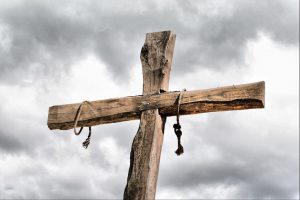
For by grace you have been saved through faith…It is the gift of God, not of works.” Ephesians 2:8-9
In the book of Genesis, we read about Adam and Eve eating the forbidden fruit after being tempted by the serpent. And, as we know, their disobedience to God—who told them to not eat the fruit—allowed sin to enter the world.
Often, we think of sin as something evil, perhaps even something evil we have done. And, some of that is true, but there’s more to sin than you might realize. To become holy and truly serve God, it’s important that we fully understand exactly what sin is, what it looks like in our lives, its consequences, and what we can do to fight against it.
Back to the Garden
When Adam (Heb. “humanity”) and Eve (Heb. “life”) ate the fruit in the garden, they were in clear violation of God’s instructions.
“And the LORD GOD commanded the man, saying, ‘Of every tree of the garden you may freely eat; but of the tree of the knowledge of good and evil you shall not eat, for in the day that you eat of it, you shall surely die.’” Genesis 2:16-17
When Satan (as a serpent) arrives on the scene and tells them they will not die, he makes a compelling argument.
“For God knows that in the day you eat of it your eyes will be opened, and you will be like God, knowing good and evil.” Genesis 3:5
What the couple failed to recognize is that they were already like God. He had already made them in His image (Genesis 1:26). But still they wondered what could be so wrong about knowing the difference between good and evil. Satan’s reasoning made sense to them. And so Adam and Eve ate the fruit, and everything began to spiral out of control.
Missing the Mark
In Hebrew, the word for sin is “khata.” It’s an old archery term that was used to indicate that the archer (or rock slinger in some cases) had failed to hit the bullseye. In a Biblical context, sin, then, means “to fail” or “to miss the mark.”
So what is the mark?
In Matthew 22:35-40, we find a Pharisee asking Jesus a question. He wants to know what the great commandment is.
“Then one of [the Pharisees], a lawyer, asked [Jesus] a question, testing Him, and saying, ‘Teacher, what is the great commandment in the law?’” (v35)
The Pharisee knows the answer, but he’s testing Jesus, expecting Him to repeat the Shema in Deuteronomy 6:4-5, which says,
“Hear, O Israel: The LORD our God, the LORD is one! You shall love the LORD your God with all your heart, with all your soul, and with all your strength.”
But instead, Jesus answers this way:
“You shall love the LORD your God with all your heart, with all your soul, and with all your mind. This is the first and great commandment (v37-38).”
So far so good. He’s in complete agreement with the Pharisee. But then, Jesus tacks on a surprise:
“And the second is like it: You shall love your neighbor as yourself. On these two commandments hang all the Law and the Prophets (v39-40).”
This new addition to the Shema was surely a shock for the Pharisee.
What Jesus is saying is that we are to love God first and foremost, but we are also required to similarly love others. To love others is the same as loving God. Jesus says His entire law hangs on this one principle.
So, if loving others is the same as loving God, then conversely, if we sin against others, we also sin against God. And if we are sinning, we are missing the mark God has set up for us—to love Him and others.
In other words, when we sin, we fail.
The Sin of Idolatry
Whenever we miss the mark to love others, we sin. And if we’re not loving others as we should, we are also not loving God as we should. Instead, we are placing ourselves and our human desires ahead of God and others.
Some people call this “falling short,” and this happens when we fail to show proper respect, kindness, compassion, and forgiveness. The fruits of the Spirit in Galatians 5:22-23 are a good guideline for gauging how we love others.

We also fall short when we choose to worship anything or anyone other than God such as money, a relationship, alcohol, food, sports or a hobby, our job, and so on. This is called idolatry, which happens when we take God off the throne, and we decide for ourselves what is good and evil.
We see examples of idolatry—putting one’s desires ahead of God’s—repeatedly in the Old Testament despite God’s repeated attempts to redeem His people.
Cain and Abel
In Genesis 4, Adam and Eve’s son, Cain, became jealous of his brother Abel because God favored Abel more. Cain’s jealousy drove him to decide it was okay to kill Abel.
Noah
Then there was Noah. God was so pleased with Noah that when God decided to flood the earth, He had Noah build an ark so he and his family would be spared death. But after the floodwaters receded, Noah planted a vineyard and liked to get drunk. His desire for wine became more important than God, which led to an embarrassing moment with his son after a heavy night of drinking (Genesis 9:20-27).
Saul
Later in the Bible, God chose a man named Saul to be the first king of Israel. Saul truly loved God, but later his jealousy over his son’s best friend, a boy named David, drove him to hunt David relentlessly. Saul, too, fell short.
David
David eventually took over the throne from Saul, and he was declared “a man after God’s own heart.” But even David had an idol. Her name was Bathsheba.
Some of us might say we simply messed up or “the devil made us do it.” We might say the temptation was just too great to overcome. The apostle James comments about this in James 1:14 where he says,
“But each one is tempted when he is drawn away by his own desires and enticed.”
Our selfish desires cause us to lack—or make no effort at all—to have self-control (a fruit of the Spirit), and so we sin.
Sin broke the relationship Adam and Eve had with God, and it still keeps us separated. God is so holy that sin cannot be tolerated in His presence. So, because we carry it inside of us, we are separated from Him. Its consequences have created corruption and guilt, and it stirs up God’s holy wrath.
James goes on to say in verse fifteen, “Then, when desire has conceived, it gives birth to sin; and sin, when it is full-grown, brings forth death.”
Death?? How does sin bring forth death?
The Price of Sin
From the moment Adam and Eve brought sin into the world, God longed to forgive and deliver them from it. In Genesis 3:16-19, after God confronted the couple about eating the fruit, He explained their punishment and then He clothed them.

How did He clothe them? With animal skins, skins that came from a blood sacrifice that atoned for Adam and Eve’s sin. Blood had to be shed in order for the sin to be forgiven. Remember, up to this point everything was still perfect because God had just created it. The animal was perfect and without sin, which made it a suitable sacrifice.
Later in Leviticus 17:11, God commands a blood sacrifice in response to sin, and millions of people for thousands of years have kept the commandment. Dutifully, they placed their hands on an unblemished lamb to transfer their sins to the animal, and then the lamb was sacrificed, thus taking away the sin forever. It also established death as the punishment for sin.
But the sacrifices weren’t enough. The people continued to sin. Finally, God said enough was enough, and He sent His son, Jesus, as the ultimate sacrifice. He was the only one qualified to take away the sins of the world and re-establish God’s relationship with His people.
Like the animal in the garden with Adam and Eve, Jesus was wholly perfect. Though He was fully human as He walked the earth, He was also still fully God, which means He never sinned. In His perfection, Jesus was sent by the Father to take on our sins, to be the lamb, and to be sacrificed in our place.
And remember that shed blood first requires a death, and death is the punishment for sin. Jesus suffered that punishment for us too.
Jesus’ sacrifice on the cross was the greatest act of love any of us will ever know. Jesus paid the price, and now we can be free from sin. Plus, His resurrection three days later makes a way for us to never suffer the penalty of death.
Jesus truly paid it all.
Freedom from Sin
Notice that Jesus’ sacrificial death provides a way for us to be free from sin, but we are not automatically free. But here’s the good news: God offers forgiveness and grace as a gift to secure our freedom from sin.
“For by grace you have been saved through faith, and that not of yourselves. It is the gift of God, not of works, lest anyone should boast.” Ephesians 2:8-9
Jesus’ shed blood on the cross covers (atones) our sin, which means God’s grace is available to anyone who wants it. All we have to do is ask for it. We do this by repenting.
Repentance and Confession
According to Vine’s Expository Dictionary, repenting (Heb. “metanoia”) means to change your mind in such a way that you reverse the effects of your previous state of mind. Some Bible teachers and pastors explain it as turning around completely so you face away from sin and instead face God with your whole heart.
But repenting doesn’t stop there. Turning to God with your whole heart is only a start. It also involves asking God to be Lord and Savior of your life plus an unwavering devotion to Him that begins with confession.
Confession is necessary for our salvation and for our developing faith. It humbles us, and it creates a closeness to God by allowing Him to be back in charge of our lives. We discover that we are truly unable to decide what is good and evil because of sin’s effects, so we willingly let God take over.
But confession is not a one-time event. It’s a daily event where we consciously and humbly invite Jesus to be the boss. Our job, then, is to simply love Him and love others. There are countless ways to show our love and devotion for God, but it begins with simply choosing to acknowledge His grace and accepting it, then sharing that love with others by demonstrating the fruits of the Spirit.
The Bible says if we do this, if we repent and receive grace, and we choose to live life God’s way, then our sins have been forgiven.
We are saved.
We are born again.
We are new creations in Christ.

The Gift of Salvation
Sin doesn’t have to control our lives, and we don’t have to suffer its consequences. Jesus already paid the price of death for us, and His atoning blood covers us so we appear blameless before the Father.
So, all we have to do is confess our sins to Jesus, our great High Priest (Hebrews 7:26), accept His gift of salvation, and invite Him into our heart. When we do this, the Father only sees His perfect Son, Jesus, when He looks at us. There is no sin.
“He has not dealt with us according to our sins, nor punished us according to our iniquities. For as the heavens are high above the earth, so great is His mercy toward those who fear Him. As far as the east is from the west, so far has He removed our transgressions from us.” Psalm 103:10-12
After we accept God’s amazing gift of grace, it becomes our goal to purposely put God first in our lives, devoting our time, talent, and treasure in His service as we daily endeavor to love others as we love Him. It’s not as hard as it might sound. Just continually put God first and everything will naturally fall into place as the Holy Spirit guides you along. Loving God and loving others will become easier and easier as you grow in your faith. Eventually, it will become the greatest joy you’ve ever known.
Have you confessed your sins to God today? I invite you to come and experience the beautiful gift of grace He offers you and the freedom it brings. I invite you to share in His love, a love so strong you can’t help but share it. I promise it will be the single best decision you will ever make in your entire life.
So, what do you say?
The Bible says, “today is the day of salvation” (2 Corinthians 6:2). Is it yours?
He stands at the door and knocks. Will you open it?
I won’t sin again